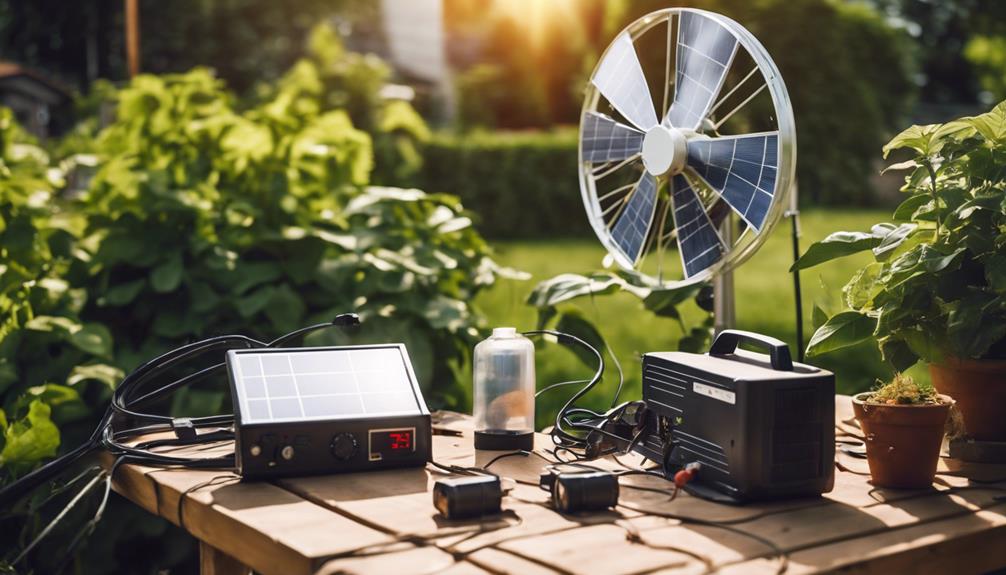Raising guineas provides numerous advantages, such as effective pest control and unique culinary options. These hardy birds thrive in free-range environments, requiring minimal maintenance and regular habitat monitoring. A balanced diet with high protein is essential, especially for growing keets. Proper handling and training build trust, while maintaining cleanliness helps prevent health issues. Breeding requires attention to ratios and nesting preferences. To protect against common challenges, secure enclosures and consistent health checks are crucial. Anyone interested in effectively managing these charming birds will discover plenty of valuable tips and practices that enhance their experience.
Key Takeaways
- Guineas provide effective pest control, particularly for ticks and mice, making them beneficial for any farm or garden.
- Ensure spacious, secure habitats for guineas to promote their health and reduce stress.
- High-protein diets are crucial for guinea keets, while mature guineas can thrive on foraged food with lower protein needs.
- Regular health checks and a clean environment are essential for preventing illness and maintaining overall wellbeing.
Benefits of Raising Guineas
Raising guineas consistently offers numerous benefits, including their pest control capabilities and unique vocal alerts that enhance farm security. These birds thrive on ticks, mice, and other pests, making them invaluable for maintaining a clean environment.
Their loud shrieks serve as natural alarm systems, alerting owners to potential predators. Guineas are hardy and less susceptible to common poultry illnesses, requiring minimal maintenance. They also protect other poultry, actively defending against small threats.
Additionally, their meat has a distinct flavor, sought after in gourmet cuisine. With entertaining social behaviors, guineas provide enjoyment for farm keepers.
Ideal Habitat for Guineas
Guineas thrive best in free-range environments that provide ample space for movement and natural foraging. These birds require spacious areas to roam and explore, as confinement can lead to stress and health issues.
Enclosures should be tall and secure, using hardware cloth to prevent predator access. While guineas can adapt to suburban settings, they benefit from flocks that help deter threats.
Regular monitoring of habitat conditions is essential for their well-being. Training guineas to recognize their territory aids in returning them to the coop at night. Keeping them with other poultry can also reduce stress and promote acclimatization.
Nutritional Needs and Feeding

Proper nutrition is essential for the health and growth of guinea keets, requiring a high-protein poultry feed to meet their developmental needs. Guinea keets thrive on feed with a 25% protein ratio until they mature.
Once mature, they can forage for most dietary requirements, needing only a 16% protein ratio in their feed.
To support their nutritional needs, keepers should consider the following:
- Provide a 20% protein feed for juvenile guineas.
- Increase protein levels during winter months or when not free-ranging.
- Monitor foraging habits to maintain health and reduce feed costs.
Meeting these nutritional needs fosters healthy, robust guinea populations.
Breeding and Incubation Tips
Successful breeding and incubation of guineas require careful attention to their unique needs and behaviors. To achieve the best results, keep a male-to-female ratio of one cock for every five hens, ensuring social harmony.
Guineas typically nest in trees or secluded areas, where cocks patrol to protect them during incubation, which lasts 26 to 28 days. Maintain an incubation temperature between 95 to 100 degrees Fahrenheit for ideal hatching conditions.
If a hen refuses to sit on her eggs, consider using an incubator. Newly hatched keets benefit from lukewarm water mixed with sugar to boost energy. Gradually decrease brooder temperatures by five degrees weekly until reaching room temperature to support healthy growth.
Health and Hygiene Practices

Maintaining good health and hygiene practices is essential for ensuring the well-being of guineas and preventing common health issues. Regular attention to their living conditions and habits can greatly impact their overall health. Guineas thrive when provided with a clean environment, proper nutrition, and opportunities for natural behaviors.
Regularly change bedding to reduce dampness and waste.
Encourage dust baths to help prevent mites and parasites.
Monitor for signs of illness and stress in keets.
Maintain cleanliness in the brooder to promote health.
Incorporating these practices into daily routines won't only foster healthier guineas but also contribute to a more productive and enjoyable experience for their keepers.
Handling and Training Guineas
Effective handling and training of guineas can enhance their well-being and improve interactions with their keepers.
Guineas, retaining their wild instincts, need a gentle approach during handling. It's essential to avoid catching them by the legs; instead, a secure grip around their wings guarantees safety.
Consistent training with positive reinforcement helps them respond to commands. Regular interaction fosters trust, making them more manageable.
Providing a clean environment, along with regular dust baths, supports their health and comfort. Keepers should monitor guineas for stress signs, as they can be sensitive to changes.
Establishing a routine and using familiar sounds can aid in acclimatization, guaranteeing guineas feel secure in their surroundings.
Common Challenges and Solutions

Raising guineas presents several common challenges, but understanding these issues and implementing practical solutions can lead to a healthier and more productive flock. One common challenge with raising guineas is their susceptibility to predators, so it’s important to provide secure housing and fencing. Additionally, guineas are known to be skittish and can easily become stressed, which can lead to health problems. Another challenge is staying cool during power outages, as guineas are sensitive to extreme temperatures and can suffer from heat stroke if not provided with adequate ventilation and shade.
One major challenge is their tendency to wander, making proper training imperative. Train guineas to return to their coop regularly.
Additionally, guineas can be susceptible to predators, so secure enclosures are essential. Use hardware cloth for predator-proofing enclosures.
Health monitoring is important, as guineas may hide signs of illness. Monitor flock health consistently for early signs of illness.
Frequently Asked Questions
Can Guineas Coexist With Other Livestock on a Farm?
Guineas can successfully coexist with other livestock on a farm. They often protect poultry from predators and adapt well to shared environments, fostering a harmonious and productive atmosphere for various animals while contributing to overall farm security.
What Are the Best Breeds of Guineas for Beginners?
When starting a garden, choosing hardy plants makes sense. Similarly, beginners should consider the Royal Purple or Lavender varieties of guineas. They're easy to manage, adapt well, and provide lively companionship while controlling pests effectively.
How Do Guineas Adapt to Different Climates?
Guineas adapt well to various climates. They thrive in warm conditions but can tolerate colder temperatures with proper shelter. Their hardiness helps them adjust, ensuring they maintain health and vigor throughout seasonal changes.
What Are the Signs of a Happy Guinea?
Like a jubilant dancer, a happy guinea struts confidently, vocalizing cheerful calls, foraging energetically, and engaging with flock mates. Their vibrant plumage and playful antics reveal contentment, showcasing the joy found in their natural behaviors.
Can Guineas Be Kept in Urban Settings Successfully?
Guineas can thrive in urban settings with adequate space and protection. They need spacious enclosures and regular monitoring to guarantee safety. Their natural instincts and social behaviors can adapt well to suburban environments with proper care.
Conclusion
To summarize, raising guineas can be both rewarding and beneficial for any homestead.
With their impressive tick-eating abilities—one guinea can consume up to 1,000 ticks in a week—these birds not only enhance farm productivity but also contribute to pest control naturally.
By understanding their habitat, nutritional needs, and care requirements, poultry enthusiasts can create a thriving environment for these unique birds.
Embracing the challenges of raising guineas ultimately leads to a vibrant and lively farm experience.










